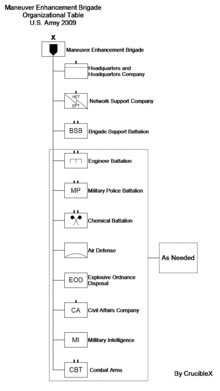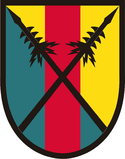Maneuver enhancement brigade

A maneuver enhancement brigade (MEB) is a self-contained, modular, and multifunctional support brigade of the United States Army customized to meet whatever mission it receives. A MEB's primary purpose is to plug into operational formations commanded by corps or division commanders, to support brigade combat teams once deployed, and to conduct tactical level tasks and support.[1] MEBs can provide command and control for up to seven battalions that are capable of owning battlespace in combat.
Battalions assigned to a MEB differ from mission to mission but their specialties typically do not repeat themselves more than twice for a certain type—when a mission dictates more than two of a certain type, the mission likely is not an MEB mission anymore but one more suited to a functional brigade.[lower-alpha 1][lower-alpha 2] For example, if a mission calls for three engineer battalions, such mission is better suited to an engineer brigade.[lower-alpha 2]
Overview
The mission of a MEB is to provide critical maneuver support to the force commander, normally at the division level. The MEB groups together a number of previously dispersed functions in order to achieve this mission. Organic to the MEB is generally a headquarters and headquarters company, a signal company and a brigade support battalion. This force can be augmented by combat engineer, military police, air defense, and/or chemical defense units. Depending on the mission it may be assigned explosive ordnance disposal, civil affairs or a tactical combat force. They are tailored with the capabilities required for each operation. More than one brigade may be assigned to a division or corps.
Maneuver enhancement brigades are designed to bridge the operational gap between brigade combat teams and functional support brigades. By modern doctrine MEB can control operational areas and are assigned a tactical combat force, usually in the form of a maneuver infantry battalion. A maneuver enhancement brigade primary goal is to provide the corps or divisional level commander with a field grade officer led formation that has a large headquarters, capable of controlling a mix of combat engineer, military police, level II medical services, communication units, NBC units and civil affair units. In addition to its attached maneuver combat battalion for security and rear area defense operations.
Unified combatant commanders may also attach these brigades directly to the Army service component command in order to serve in the theater army rear area of operations or joint security area, where the MEB serves as the force protection unit for the US force headquarters.[3]
There are 19 combat support brigades (maneuver enhancement) the Army plans to create, with 16 in the Army National Guard and 3 in the Army Reserve. The organization is one of five types of multifunctional support brigades that have been established under the transformation to the modular force. The others are the sustainment brigade, battlefield surveillance brigade, combat aviation brigade, and fires brigade.[4]
Maneuver enhancement brigades
| Unit | Patch | Component | Home Headquarters |
|---|---|---|---|
| 26th Maneuver Enhancement Brigade |  |
National Guard | Massachusetts |
| 55th Maneuver Enhancement Brigade |  |
National Guard | Philadelphia, PA |
| 67th Maneuver Enhancement Brigade |  |
National Guard | Lincoln, NE |
| 92nd Maneuver Enhancement Brigade |  |
National Guard | Puerto Rico |
| 110th Maneuver Enhancement Brigade |  |
National Guard | Missouri |
| 130th Maneuver Enhancement Brigade |  |
National Guard | North Carolina |
| 136th Maneuver Enhancement Brigade |  |
National Guard | Texas |
| 141st Maneuver Enhancement Brigade |  |
National Guard | North Dakota |
| 149th Maneuver Enhancement Brigade |  |
National Guard | Kentucky |
| 158th Maneuver Enhancement Brigade |  |
National Guard | Arizona |
| 157th Maneuver Enhancement Brigade |  |
National Guard | Wisconsin |
| 196th Maneuver Enhancement Brigade |  |
National Guard | South Dakota |
| 204th Maneuver Enhancement Brigade |  |
National Guard | Utah |
| 218th Maneuver Enhancement Brigade |  |
National Guard | South Carolina |
| 226th Maneuver Enhancement Brigade |  |
National Guard | Alabama |
| 301st Maneuver Enhancement Brigade |  |
Army Reserve | Washington |
| 302d Maneuver Enhancement Brigade |  |
Army Reserve | Massachusetts |
| 303rd Maneuver Enhancement Brigade |  |
Army Reserve | Hawaii |
| 404th Maneuver Enhancement Brigade |  |
National Guard | Illinois |
| 648th Maneuver Enhancement Brigade |  |
National Guard | Georgia |
Inactivated brigades
- 1st Maneuver Enhancement Brigade, active duty - inactivated 2015
- 3rd Maneuver Enhancement Brigade, active duty - inactivated 2011
- 4th Maneuver Enhancement Brigade, active duty - inactivated 2015
- 111th Maneuver Enhancement Brigade, New Mexico Army National Guard - became a sustainment brigade in 2016
Notes
- ↑ Tan (2012) "Typically, what we look at is two of any type of battalion," McCabe said. "That's two engineer battalions, two MP battalions, two chemical battalions and a tactical fighting force."[2]
- 1 2 Tan (2012) "If a mission dictates more than two of a certain type of battalion, the mission likely is not an MEB mission anymore but one more suited to a functional brigade, he said. For example, if the mission calls for three engineer battalions, the tasking may be better suited to an engineer brigade, he said."[2]
References
- ↑ "APS - Additional Information on Army Related Topics". Army.mil. Retrieved 2014-03-01.
- 1 2 "Little-known MEBs adapt to multiple missions | Army Times". Armytimes.com. Retrieved 2014-03-01.
- ↑ Headquarters, Department of the Army (27 February 2008). FM 3–0, Operations. Washington, DC: GPO. p. C–11 and pp. C–40 — C–44. ISBN 9781437901290. OCLC 780900309. ("Source A" (PDF). "Source B" (PDF). Archived from the original (PDF) on 2009-02-13. Retrieved 31 August 2013.)
- ↑ "Army Logistician Alog News". Almc.army.mil. Retrieved 2014-03-01.
- ↑ "National Guard Maneuver Enhancement Brigade's Role in Domestic Missions". Dtic.mil. Retrieved 2014-03-01.
- ↑ "Little-known MEBs adapt to multiple missions". Armytimes.com. Retrieved 2014-03-01.